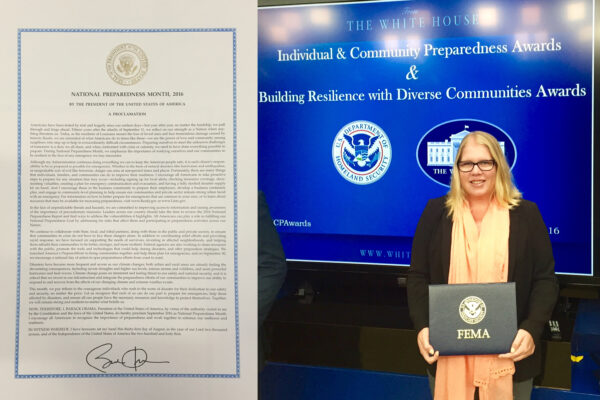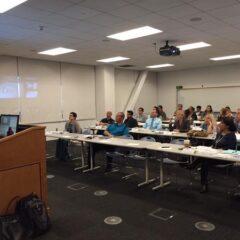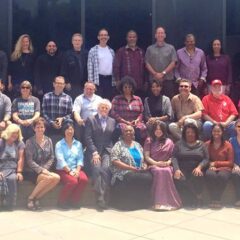By Rebecca Cheng
Brie Loskota, executive director of the USC Center for Religion and Civic Culture, was honored at the White House last week for her work bridging faith organizations and government agencies to improve community disaster preparedness.
The Federal Emergency Management Agency’s Building Resilience with Diverse Communities program specifically recognized Loskota’s leadership in the Los Angeles Faith Community Roundtable, in which CRCC is a founding partner. The Roundtable connects different Los Angeles government sectors, including the Fire Emergency Management and Los Angeles Police Department, with local faith leaders.
“Brie was really the instigator around the Los Angeles effort, and it is because of her urging that we were able to pull all these groups together,” Jannah Scott, deputy director for the Department of Homeland Security’s Center for Faith-based and Neighborhood Partnerships, said at the awards ceremony.
“It was wonderful to see that CRCC’s vision and the partnership that we were able to catalyze between local government, federal government and communities has paid off and been recognized,” Loskota said after the ceremony.
The impetus for a roundtable developed out of CRCC’s research. CRCC’s 2012 report, “Faithful Action,” highlighted the importance of faith-based organizations in assisting communities before, during and after disasters, such as September 11 and Hurricane Katrina. Loskota and her co-authors, Hebah Farrag and Richard Flory, recommended in the report that faith communities and public agencies work together to make whole communities more resilient.
“When it comes to disaster response, religious communities have been providers of care in the aftermath of disasters, but they have not been integrated into planning efforts,” Loskota said. “Our hope was that the government could develop policies that better integrate religious communities into official processes and make their work more effective.”
The Los Angeles Emergency Management Department established the Faith Community Roundtable in 2012. Loskota has chaired it from the beginning.
The roundtable has led the government to connect with communities in new ways and strengthen relationships based on good will and cooperation, she said. The network of leaders participates in training exercises, engages new groups and presents preparedness fairs. The agency also has incorporated faith groups’ capabilities into policies, plans and operating procedures.
For Loskota, the roundtable is the foundation for future partnerships between faith-based organizations and public agencies. For example, if a congregation has a kitchen that could be used to feed people in a disaster, they could work with public agencies to feed people now as well. Such work, in turn, would help them be ready for action following a disaster. “As groups begin to see the government as partners, so too will government see the potential of groups to address social issues.”
Although increased communication and transparency will be necessary to improve burgeoning relationships, she remains optimistic about the work done and networks established so far.
“I think the most important thing that we can do as people who care about a city, community, or country is to find ways to bring people together based on good will and a shared vision to create a structure and a process that actually makes an impact and isn’t just for show,” said Loskota. “That what we did in LA, and that’s what I’m very proud of.”
CRCC’s research on faith groups and disasters has also become a set of resources to increase religious literacy and competency among disaster response professionals and volunteers. CRCC partnered with National Disaster Interfaiths Network (NDIN) to create these resources, an online course available through the FEMA Emergency Management Institute and an in-classroom training course. CRCC and NDIN are presenting in-person courses in December 5-7 in Los Angeles.
Visit the following links for more information:
December 5: Engaging Faith Communities in Disasters
December 6-7: Disaster Chaplaincy Training and Certification
Click here to see all of CRCC’s resources on Disaster Response





